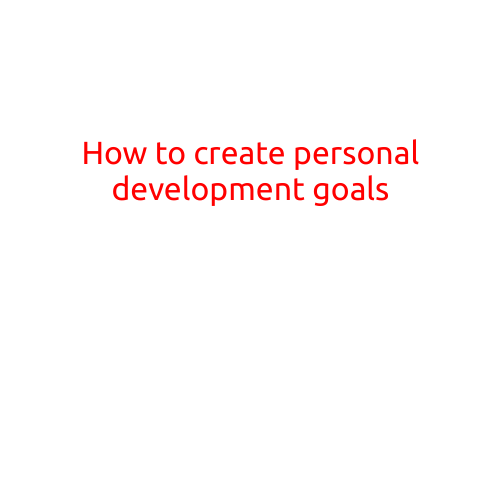
How to Create Personal Development Goals
Are you tired of feeling stuck in a rut and wanting to improve your life? Setting personal development goals can be a powerful way to achieve your aspirations and reach your full potential. However, creating effective goals can be a daunting task, especially if you’re not sure where to start. In this article, we’ll provide you with a step-by-step guide on how to create personal development goals that will help you achieve success and fulfillment.
Why Set Personal Development Goals
Before we dive into the process of creating personal development goals, let’s talk about why they’re important. Setting goals challenges you to think critically about what you want to achieve and how you can achieve it. Without goals, you may find yourself drifting through life without a sense of direction or purpose. By setting goals, you can:
- Increase motivation and focus
- Improve self-awareness and self-discipline
- Enhance your sense of purpose and fulfillment
- Achieve greater success and accomplishment
Step 1: Identify Your Values
The first step in creating personal development goals is to identify your values. What matters most to you? What are your core values and priorities? Take some time to reflect on what’s most important to you, whether it’s family, friendship, health, or personal growth.
Write down your values and prioritize them. This will help you create goals that align with what’s most important to you.
Step 2: Reflect on Your Strengths and Weaknesses
Next, take some time to reflect on your strengths and weaknesses. What are you naturally good at? What areas do you struggle with? Be honest with yourself and acknowledge your limitations.
This exercise will help you identify areas where you may need to work on building skills or improving habits.
Step 3: Brainstorm Goals
Now that you’ve identified your values and reflected on your strengths and weaknesses, it’s time to brainstorm goals. Take 10-15 minutes to write down as many goals as you can think of, without worrying about their feasibility or practicality. This is just a brainstorming exercise, so let your imagination run wild!
Ask yourself questions like:
- What do I want to achieve in the next 6-12 months?
- What skills do I want to develop?
- What habits do I want to build or break?
- What kind of person do I want to become?
Step 4: Prioritize Your Goals
Once you have a list of goals, it’s time to prioritize them. Which goals are most important to you? Which ones align with your values and strengths?
Use the Eisenhower Matrix to categorize your goals into four quadrants:
- Urgent and important (Do first)
- Important but not urgent (Schedule)
- Urgent but not important (Delegate)
- Not urgent or important (Delete)
Step 5: Make Your Goals SMART
Now that you’ve prioritized your goals, it’s time to make them SMART. SMART stands for Specific, Measurable, Achievable, Relevant, and Time-bound.
- Specific: Clearly define what you want to achieve.
- Measurable: Quantify your goal so you can track progress.
- Achievable: Make sure your goal is challenging but realistic.
- Relevant: Align your goal with your values and priorities.
- Time-bound: Set a specific deadline for achieving your goal.
Example of a SMART goal: “I want to increase my daily step count by 1,000 steps within the next 3 months by taking a 30-minute walk during my lunch break, 3 times a week.”
Step 6: Create an Action Plan
Now that you have a SMART goal, it’s time to create an action plan. Break down your goal into smaller, manageable tasks. Identify any obstacles that may stand in your way and develop strategies for overcoming them.
For example, if your goal is to start a new exercise routine, your action plan might include:
- Researching different workout routines and finding one that suits you
- Setting aside time each day for exercise
- Finding a workout buddy to stay motivated
- Rewarding yourself for reaching milestones
Step 7: Track Your Progress
Finally, it’s essential to track your progress and stay accountable. Set reminders, track your progress on a spreadsheet, or share your goals with a friend or mentor.
Celebrate your successes and don’t be too hard on yourself when you encounter setbacks. Remember that progress may not always be linear, but it’s essential to keep moving forward.
Conclusion
Creating personal development goals takes time and effort, but it’s a powerful way to improve your life and achieve your aspirations. By following these steps, you can create goals that align with your values, prioritize your strengths, and drive you towards success. Remember to stay focused, motivated, and adaptable, and you’ll be well on your way to achieving your personal development goals.





